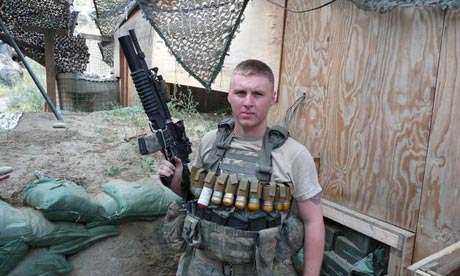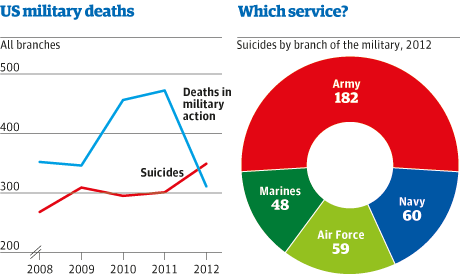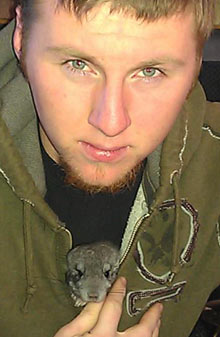
William Busbee was in many ways the archetype of the US soldier
Libby Busbee is pretty sure that her son William never sat through or read Shakespeare's Macbeth, even though he behaved as though he had. Soon after he got back from his final tour of Afghanistan, he began rubbing his hands over and over and constantly rinsing them under the tap.
"Mom, it won't wash off," he said.
"What are you talking about?" she replied.
"The blood. It won't come off."
On 20 March last year, the soldier's striving for self-cleanliness came to a sudden end. That night he locked himself in his car and, with his mother and two sisters screaming just a few feet away and with Swat officers encircling the vehicle, he shot himself in the head.
At the age of 23, William Busbee had joined a gruesome statistic. In 2012, for the first time in at least a generation, the number of active-duty soldiers who killed themselves, 177, exceeded the 176 who were killed while in the war zone. To put that another way, more of America's serving soldiers died at their own hands than in pursuit of the enemy.

Credit: Guardian graphics
US military suicides in charts:
http://www.guardian.co.uk/news/datab...rts?intcmp=239
Across all branches of the US military and the reserves, a similar disturbing trend was recorded. In all, 349 service members took their own lives in 2012, while a lesser number, 295, died in combat.
Shocking though those figures are, they are as nothing compared with the statistic to which Busbee technically belongs. He had retired himself from the army just two months before he died, and so is officially recorded at death as a veteran – one of an astonishing 6,500 former military personnel who killed themselves in 2012, roughly equivalent to one every 80 minutes.
'He wanted to be somebody, and he loved the army'
Busbee's story, as told to the Guardian by his mother, illuminates crucial aspects of an epidemic that appears to be taking hold in the US military, spreading alarm as it grows. He personifies the despair that is being felt by increasing numbers of active and retired service members, as well as the inability of the military hierarchy to deal with their anguish.
That's not, though, how William Busbee's story began. He was in many ways the archetype of the American soldier. From the age of six he had only one ambition: to sign up for the military, which he did when he was 17.
"He wasn't the normal teenager who went out and partied," Libby Busbee said. "He wanted to be somebody. He had his mind set on what he wanted to do, and he loved the army. I couldn't be more proud of him."
Once enlisted, he was sent on three separate year-long tours to Afghanistan. It was the fulfillment of his dreams, but it came at a high price. He came under attack several times, and in one particularly serious incident incurred a blow to the head that caused traumatic brain injury. His body was so peppered with shrapnel that whenever he walked through an airport security screen he would set off the alarm.
The mental costs were high too. Each time he came back from Afghanistan. between tours or on R&R, he struck his mother as a little more on edge, a little more withdrawn. He would rarely go out of the house and seemed ill at ease among civilians. "I reckon he felt he no longer belonged here," she said.
Once, Busbee was driving Libby in his car when a nearby train sounded its horn. He was so startled by the noise that he leapt out of the vehicle, leaving it to crash into the curb. After that, he never drove farther than a couple of blocks.
Nights were the worst. He had bad dreams and confessed to being scared of the dark, making Libby swear not to tell anybody. Then he took to sleeping in a closet, using a military sleeping bag tucked inside the tiny space to recreate the conditions of deployment. "I think it made him feel more comfortable," his mother said.
After one especially fraught night, Libby awoke to find that he had slashed his face with a knife. Occasionally, he would allude to the distressing events that led to such extreme behaviour: there was the time that another soldier, aged 18, had been killed right beside him; and the times that he himself had killed.
William told his mother: "You would hate me if you knew what I've done out there."
"I will never hate you. You are the same person you always were," she said.
"No, Mom," he countered. "The son you loved died over there."
Soldiers' psychological damage
For William Nash, a retired Navy psychiatrist who directed the marine corps' combat stress control programme, William Busbee's expressions of torment are all too familiar. He has worked with hundreds of service members who have been grappling with suicidal thoughts, not least when he was posted to Fallujah in Iraq during the height of the fighting in 2004.
He and colleagues in military psychiatry have developed the concept of "moral injury" to help understand the current wave of self-harm. He defines that as "damage to your deeply held beliefs about right and wrong. It might be caused by something that you do or fail to do, or by something that is done to you – but either way it breaks that sense of moral certainty."
Contrary to widely held assumptions, it is not the fear and the terror that service members endure in the battlefield that inflicts most psychological damage, Nash has concluded, but feelings of shame and guilt related to the moral injuries they suffer. Top of the list of such injuries, by a long shot, is when one of their own people is killed.
"I have heard it over and over again from marines – the most common source of anguish for them was failing to protect their 'brothers'. The significance of that is unfathomable, it's comparable to the feelings I've heard from parents who have lost a child."
Incidents of "friendly fire" when US personnel are killed by mistake by their own side is another cause of terrible hurt, as is the guilt that follows the knowledge that a military action has led to the deaths of civilians, particularly women and children. Another important factor, Nash stressed, was the impact of being discharged from the military that can also instil a devastating sense of loss in those who have led a hermetically sealed life within the armed forces and suddenly find themselves excluded from it.

That was certainly the case with William Busbee. In 2011, following his return to Fort Carson in Colorado after his third and last tour of Afghanistan, he made an unsuccessful attempt to kill himself. He was taken off normal duties and prescribed large quantities of psychotropic drugs which his mother believes only made his condition worse.
Eventually he was presented with an ultimatum by the army: retire yourself out or we will discharge you on medical grounds. He felt he had no choice but to quit, as to be medically discharged would have severely dented his future job prospects.
When he came home on 18 January 2012, a civilian once again, he was inconsolable. He told his mother: "I'm nothing now. I've been thrown away by the army."
The suffering William Busbee went through, both inside the military and immediately after he left it, illustrates the most alarming single factor in the current suicide crisis: the growing link between multiple deployments and self-harm. Until 2012, the majority of individuals who killed themselves had seen no deployment at all. Their problems tended to relate to marital or relationship breakdown or financial or legal worries back at base.
The most recent department of defense suicide report, or DODSER, covers 2011 . It shows that less than half, 47%, of all suicides involved service members who had ever been in Iraq or Afghanistan. Just one in 10 of those who died did so while posted in the war zone. Only 15% had ever experienced direct combat.
The DODSER for 2012 has yet to be released, but when it is it is expected to record a sea change. For the first time, the majority of the those who killed themselves had been deployed. That's a watershed that is causing deep concern within the services.
"We are starting to see the creeping up of suicides among those who have had multiple deployments," said Phillip Carter, a military expert at the defence thinktank Center for a New American Security that in 2011 published one of the most authoritative studies into the crisis . He added that though the causes of the increase were still barely understood, one important cause might be the cumulative impact of deployments – the idea that the harmful consequences of stress might build up from one tour of Afghanistan to the next.
Over the past four years the Pentagon, and the US Department of Veterans Affairs, have invested considerable resources at tackling the problem. The US Department of Defense has launched a suicide prevention programme that tries to help service members to overcome the stigma towards seeking help. It has also launched an education campaign encouraging personnel to be on the look out for signs of distress among their peers under the rubric "never let our buddy fight alone".
Despite such efforts, there is no apparent let up in the scale of the tragedy. Though President Obama has announced a draw-down of US troops from Afghanistan by the end of 2014, experts warn that the crisis could last for at least a decade beyond the end of war as a result of the delayed impact of psychological damage.
It's all come in any case too late for Libby Busbee. She feels that her son was let down by the army he loved so much. In her view he was pumped full of drugs but deprived of the attention and care he needed.
William himself was so disillusioned that shortly before he died he told her that he didn't want a military funeral; he would prefer to be cremated and his ashes scattered at sea. "I don't want to be buried in my uniform – why would I want that when they threw me away when I was alive," he said.
In the end, two infantrymen did stand to attention over his coffin, the flag was folded over it, and there was a gun salute as it was lowered into the ground. William Busbee was finally at rest, though for Libby Busbee the torture goes on.
"I was there for his first breath, and his last," she said. "Now my daughters and me, we have to deal with what he was going through."
http://www.guardian.co.uk/world/2013...idemic-veteran

Comment